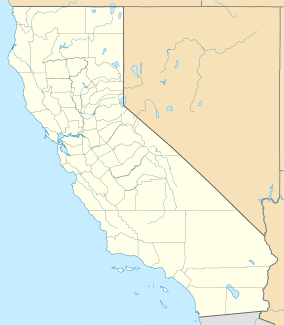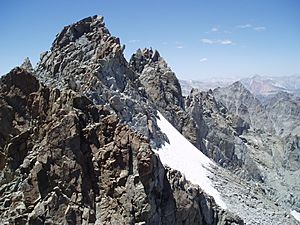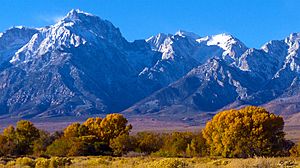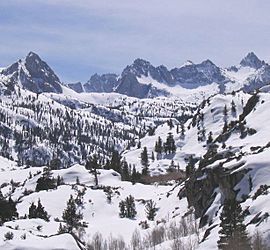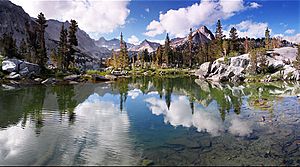John Muir Wilderness facts for kids
Quick facts for kids John Muir Wilderness |
|
|---|---|
|
IUCN Category Ib (Wilderness Area)
|
|
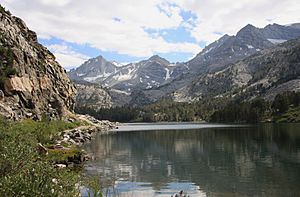
Long Lake in Little Lakes Valley, John Muir Wilderness
|
|
| Location | Fresno / Inyo / Mono / Madera counties, California, United States |
| Nearest city | Fresno, CA |
| Area | 580,323 acres (2,348.48 km2) |
| Established | January 1, 1964 |
| Governing body | U.S. Forest Service |
The John Muir Wilderness is a special wilderness area in California. It stretches for about 90 miles (145 km) along the top of the Sierra Nevada mountains. This amazing area is part of the Inyo National Forest and Sierra National Forest.
It was created in 1964 by the Wilderness Act. The wilderness is named after John Muir, a famous naturalist who loved nature. It covers a huge area of about 581,000 acres (2,351 km²). You can find it from Mammoth Lakes in the north to Mount Whitney in the south. It also touches Kings Canyon National Park.
Contents
Exploring the John Muir Wilderness: Mountains and Rocks
This wilderness is home to some of the most stunning and tallest peaks in the Sierra Nevada. There are 57 mountains here that are over 13,000 feet (4,000 meters) high!
These mountains are mostly made of granite. This hard rock was shaped over millions of years by huge sheets of ice called glaciers. The southernmost glacier in the United States, the Palisade Glacier, is found right here.
The eastern side of the wilderness rises very steeply. It goes up about 6,000 to 8,000 feet (1,800 to 2,400 meters) in just 5 to 6 miles (8 to 10 km)! The mountain tops here are usually between 12,000 and 14,000 feet (3,700 to 4,300 meters) high.
Famous Peaks to Discover
One of the most famous mountains is Mount Whitney. It is the highest peak in the continental United States! Other important mountains include the Palisades and Mount Humphreys. Mount Muir is also nearby, just south of Mount Whitney.
Mount Williamson is the second-highest peak in the wilderness. It stands at 14,375 feet (4,382 meters). This mountain rises straight up from the Owens Valley floor. It's a truly impressive sight!
Nature and Wildlife in the Wilderness
The John Muir Wilderness has the largest area above 10,000 feet (3,000 meters) in the continental U.S. This means it has many high-altitude subalpine meadows.
Trees and Plants
You'll find special trees like whitebark pine and foxtail pine growing above 10,800 feet (3,300 meters). A bit lower, between 9,000 and 10,800 feet (2,700 and 3,300 meters), lodgepole pine trees are common. Even lower down, you'll see forests of Jeffrey pine.
Animals You Might See
Many cool animals live in this wilderness. Keep an eye out for yellow-bellied marmots, pikas, and golden-mantled ground squirrels. You might also spot Clark's nutcracker birds. The streams are home to golden trout. And yes, there are black bears here too!
The wilderness also has special areas set aside for Sierra Nevada bighorn sheep. These areas help protect this unique type of wild sheep.
Fun Things to Do in the Wilderness
The John Muir Wilderness is a fantastic place for outdoor adventures! It has almost 590 miles (950 km) of hiking trails.
Hiking Adventures
Two very famous long-distance trails pass through this wilderness: the John Muir Trail and the Pacific Crest Trail. Both of these trails run from north to south through the area.
This wilderness is one of the most visited in the United States. Because so many people want to visit, you usually need a special permit if you plan to stay overnight. This helps protect the wilderness for everyone.
Beautiful Lakes to Explore
The John Muir Wilderness is dotted with many beautiful lakes. They are often surrounded by towering granite peaks.
Some of the notable lakes include:
- Duck Lake
- Lake Virginia
- Squaw Lake
 | Madam C. J. Walker |
 | Janet Emerson Bashen |
 | Annie Turnbo Malone |
 | Maggie L. Walker |


